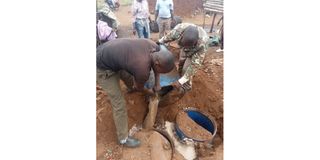Latrines, cemeteries now preferred dens for illicit brewers amid crackdown

National Government Administration Officers and police conduct a crackdown in Lanet area, on November 15
Illicit brew merchants in Nakuru have devised innovative and unconventional ways of conducting their business without raising suspicions amid a 100-day crackdown on banned liquor.
This comes after Rift Valley Regional Commissioner Maalim Mohamed announced the crackdown to eliminate illicit and counterfeit alcoholic drinks that have claimed lives in the region.
Investigations by the Nation have established that those engaging in the trade use ingenious tricks to evade police dragnets.
Illicit brew dealers in areas like Molo, Njoro, Bahati, Kuresoi South, Kuresoi North and parts of Nakuru city, for instance, conduct their business in odd places, including cemeteries, in toilets, dark alleys and other secluded places away from the eyes of state agencies.
In the city, the business is booming at the Nakuru South and Nakuru North cemeteries.
“Away from the normal illicit brew dens known by police officers and local administrators, dealers now use sachets and other packets to conduct the trade in broad daylight without any detection,” revealed Jared Mwema, a trader in the city.
“Consumers visit these places and disguise themselves as mourners looking for burial space as they conduct their transactions.”
The trade also goes on in other secluded places, including toilets and forests.
Informal settlements in the city, Molo, Njoro, Gilgil and Naivasha are also major centres for the trade.
In the city, the trade has retreated to the slums of Kaptembwa, Kivumbini, Kwa Rhonda, Murogi, Kanyon, London and other densely populated areas where it is concealed from law enforcers.
In these areas, the liquor is sold in sachets in dark alleys away from the police and administrators.
Kanyon, which has become popular for the sale of illicit brew, is a few metres from the Bondeni Police Station.
Illicit liquor has in the past two years been blamed for the deaths of more than 20 people in Nakuru.
On August 8, 2021, for instance, it killed 10 people in Nakuru and left many fighting for their lives in local hospitals.
The 10 died after consuming ‘poisoned’ illicit liquor in the Hodi Hodi area of Bahati.
Two months later, in December 2021, six more people died after consuming illicit brew in Jawatho village, Njoro.
In August this year, illicit liquor also killed four people in Molo sub-county.
Residents, illicit liquor has killed several people and turned dozens of youths into zombies in several parts of Nakuru.
“We have lost many of our people, especially the youth who have died after consuming illicit brew. Most of the youth who engage in crime also do so under the influence of drugs and illicit brew," Ms Mary Nyambura, a resident of Kanyon, told the Nation.
Another resident, Margaret Wambui, said the illicit brew trade and consumption have increased the rate of crime in parts of Nakuru.
“The crime rate in various parts of Nakuru has shot upwards due to illicit brew. The situation is dire. A few months ago, thieves stormed a funeral home in Molo, broke in and made away with valuables. We have witnessed several other incidents of insecurity in Molo municipality and far-flung areas,” said Ms Wambui.
“Many of the youth have died after consuming illicit liquor and left their young families suffering.”
Meanwhile, a multi-agency operation formed by Mr Mohamed, the Rift Valley regional commissioner, has launched a crackdown on illicit liquor.
The team will also target bar operators licensed by county governments and high-end wholesale and retail outlets, as it has emerged that counterfeiters are also targeting expensive alcohol brands in the market.
“In the past, authorities have been training their eyes on cheaper brands, but we will not be thrown off track by fraudsters counterfeiting premium and luxurious whiskies, brandy and vodka,” Mr Mohamed warned.
“Dealers in fake products are also increasingly targeting far-flung villages. We will tighten surveillance in major towns and even remote areas.”
President William Ruto, on a tour of Mombasa last week, announced a fresh crackdown on illicit liquor and drugs.
He directed national government administrators and the police to target dealers.





